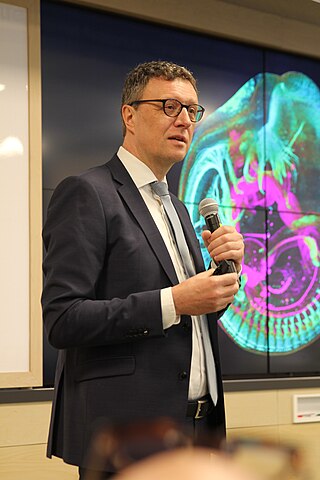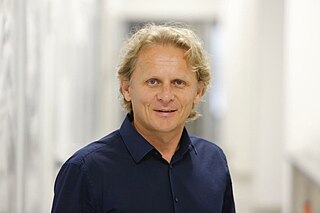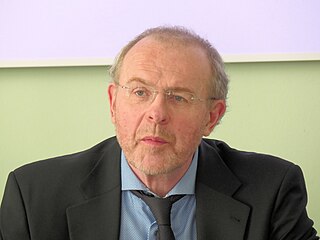Related Research Articles

Christiane (Janni) Nüsslein-Volhard is a German developmental biologist and a 1995 Nobel Prize in Physiology or Medicine laureate. She is the only woman from Germany to have received a Nobel Prize in the sciences.

The Gottfried Wilhelm Leibniz Prize, or Leibniz Prize, is awarded by the German Research Foundation to "exceptional scientists and academics for their outstanding achievements in the field of research". Since 1986, up to ten prizes have been awarded annually to individuals or research groups working at a research institution in Germany or at a German research institution abroad. It is considered the most important research award in Germany.

Patrick Cramer is a German chemist, structural biologist, and molecular systems biologist. In 2020, he was honoured to be an international member of the National Academy of Sciences. He became president of the Max Planck Society in June 2023.

Günter Matthias Ziegler is a German mathematician who has been serving as president of the Free University of Berlin since 2018. Ziegler is known for his research in discrete mathematics and geometry, and particularly on the combinatorics of polytopes.
The Heinz Maier-Leibnitz-Preis, in honor and memory of the German physicist Heinz Maier-Leibnitz, is funded by the Bundesministerium für Bildung und Forschung, and it is awarded by a selection committee appointed by the Deutsche Forschungsgemeinschaft and the BMBF. Since 2013, there are ten recipients of the prize and each receives 20,000 Euros, which is an increase over the original 16,000 Euros that had been given to six recipients per year until 2012.
Karl Leo is a German physicist.

Ivan Đikić is a Croatian-German molecular biologist who is the Director of the Institute of Biochemistry II at Goethe University Frankfurt.

Gunther Hartmann is a German immunologist and clinical pharmacologist. Since 2007 he has been the Director of the Institute of Clinical Chemistry and Clinical Pharmacology at the University Hospital of the University of Bonn.

Volker Haucke is a biochemist and cell biologist. He is Director of the Leibniz-Forschungsinstitut für Molekulare Pharmakologie Berlin (FMP) Berlin and Professor of Molecular Pharmacology at the Institute for Pharmacy of the Free University of Berlin.
Rohini Kuner is an Indian-born German pharmacologist and director of the Institute of Pharmacology at Heidelberg University.
Barbara Casadei is British Heart Foundation (BHF) Professor of Cardiovascular Medicine at the University of Oxford, based in the Radcliffe Department of Medicine.
Rhian M. Touyz Koppel MBBCh, MSc (Med), PhD, FRCP, FRSE, FMedSci, FCAHS is a Canadian medical researcher. She is currently serving as the Executive Director and Chief Scientific Officer of the Research Institute of the McGill University Health Centre in Montreal, Canada, since 2021. A clinician scientist, her research primarily focuses on hypertension and cardiovascular disease.
Elena Conti is an Italian biochemist and molecular biologist. She serves as Director and Scientific Member of the Max Planck Institute of Biochemistry in Martinsried, Germany, where she uses structural biology and biophysical techniques to study RNA transport and RNA metabolism. Together with Elisa Izaurralde, she helped characterize proteins important for exporting mRNA out of the nucleus.
Frank Bradke is a German neurobiologist who works on the physiological regeneration of nerve cells in the central nervous system. In 2016, he was awarded the Gottfried Wilhelm Leibniz Prize for his "pioneering research in the field of regenerative neurobiology." He is currently a Group Leader at the German Center for Neurodegenerative Diseases. He is a member of the Editorial Board for Current Biology.

Nikolaus Rajewsky is a German system biologist at the Max-Delbrück-Center for Molecular Medicine (MDC) and at the Charité in Berlin. He founded and directs the “Berlin Institute for Medical Systems Biology”. He leads the Rajewsky lab, where he studies how RNA regulates gene expression. He also co-chairs LifeTime, a pan-European research initiative of more than 90 academic institutions and 70 companies, which aims to revolutionize healthcare by mapping, understanding, and targeting cells during disease progression. LifeTime integrates several technologies: single-cell multiomics, machine learning, and personalized disease models such as organoids. Rajewsky has received numerous awards and honors, including the most prestigious German award, the Gottfried Wilhelm Leibniz Prize, endowed with 2.5 million euros by the German Research Foundation (DFG).

Günter Breithardt is a German physician, cardiologist and emeritus university professor. He is known for his research in the field of rhythmology, especially the diagnosis and pharmacological and non-pharmacological therapy of cardiac arrhythmias and acute cardiac death, in particular the identification of arrhythmia-triggering gene mutations. For 21 years he headed the Medical Clinic and Polyclinic C at Münster University Hospital. A number of his academic students hold university management and chief physician positions.
Elisabetta Dejana is an Italian cell biologist and an expert on regulation of vascular system development. She has published widely and is frequently cited for her work. She has received several important awards. Dejana is a full professor at the University of Milan and has also been appointed full professor at the Department of Immunology, Genetics and Pathology at Uppsala University in Sweden.

Robert Michael Graham AO, FAA, FAHMS is an Australian-born clinician-scientist. He is the Des Renford Professor of Medicine at University of New South Wales and the Head of the Molecular Cardiology and Biophysics Division at Victor Chang Cardiac Research Institute.

Thomas Boehm is a German immunologist. He is a Director of the Max Planck Institute for Immunobiology and Epigenetics in Freiburg im Breisgau. He has won a variety of prizes for his research work.

Jason C. Kovacic is an Australian-born cardiologist and physician-scientist; the Robert Graham Chair and Professor of Medicine, University of New South Wales; Executive Director of the Victor Chang Cardiac Research Institute in Sydney, Australia; and Professor of Medicine (Cardiology) at the Icahn School of Medicine at Mount Sinai, New York.
References
- 1 2 Stefanie Dimmeler, Lifeboat Foundation, retrieved 28 May 2010.
- ↑ Boehringer Ingelheim Fonds Archived 2010-02-10 at the Wayback Machine , Foundation for Basic Research in Medicine, retrieved 28 May 2010
- ↑ Promoting the healing process after a heart attack, Eurekalert, published 28 October 2008, retrieved 28 May 2010.
- ↑ "RheinMain: DZHK". dzhk.de. Retrieved 2019-09-18.
- ↑ BMBF-Internetredaktion. "Deutsche Zentren der Gesundheitsforschung – BMBF". Bundesministerium für Bildung und Forschung – BMBF (in German). Retrieved 2019-09-18.
- ↑ "DFG – EXS 2026: Cardio-Pulmonary Institute (CPI)". www.dfg.de (in German). Retrieved 2019-09-18.
- ↑ "The Otto Warburg Medal 2022 goes to Stefanie Dimmeler". Aktuelles aus der Goethe-Universität Frankfurt (in German). 13 April 2022. Retrieved 18 November 2022.
- ↑ "Academy awards travelling fellowships to international researchers | Australian Academy of Science". www.science.org.au. Retrieved 2019-09-18.
- ↑ "Mitglieder". www.leopoldina.org (in German). Retrieved 2019-09-18.
- ↑ "25 000-Euro-Preis für Frankfurter Forscherin". Frankfurter Neue Presse (in German). 2017-06-28. Retrieved 2019-09-18.
- ↑ Sellke Frank W.; Peterson Eric D. (2017-01-03). "Highlights of the American Heart Association Scientific Sessions 2016". Circulation. 135 (1): 100–101. doi: 10.1161/CIRCULATIONAHA.116.026548 . PMID 28028063.